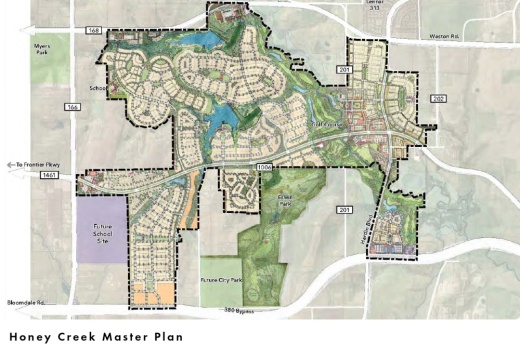McKinney City Council learned about plans for the potential district at its Dec. 6 meeting. Republic Property Group, a Dallas-based real estate developer, wants to create a Municipal Management District on 1,800 acres in north McKinney, according to city documents. The proposed Honey Creek district is west of US 75 and north of US 380, near Erwin Park. The district would be the first of its kind in McKinney, according to Executive Director of Development Services Michael Quint.
The mixed-use development would include residential, commercial and office buildings as well as other amenities, parks, trails and open space, according to a presentation given by Jake Wagner, co-CEO and partner of Republic Property Group. Wagner said the project would also include implementing about $100 million in infrastructure improvements, including an east-west expansion of Laud Howell Parkway.
The developers are looking to use a municipal management district, which is a type of financing that can be used to fund infrastructure and public facilities in a residential and commercial development project, according to the Government Finance Officers Association of the United States and Canada. Republic Property Group has completed other master-planned communities in the area using similar financing districts, including Walsh in Fort Worth and Light Farms in Celina.
McKinney City Council established a policy for another type of special financing district, called public improvement districts, in September 2021, and much of the standards for the proposed municipal management district would adhere to that policy, Wagner said.
“[Municipal management districts have] the same purpose and intent of any district. ... It's funding very expensive infrastructure and enhancements that really make the place come alive,” Wagner said.
The proposed district type does differ from the public improvement district model in that the district would be created by the state Legislature rather than the city and managed by a district board appointed by the developer. The city would also not be financially responsible for the debt from development bonds or levying of assessments to repay that debt, Wagner said.
“Since [the city] is not the bond issuer ... it gives [the city] some insulation from that risk,” Wagner said.
The council will consider the matter at its next meeting on Dec. 20, where the developer will request formal consent from the city. The resolution, if approved, would be a show of support from the city for the developer to present while working to get the district created at the upcoming state legislative session in 2023.





